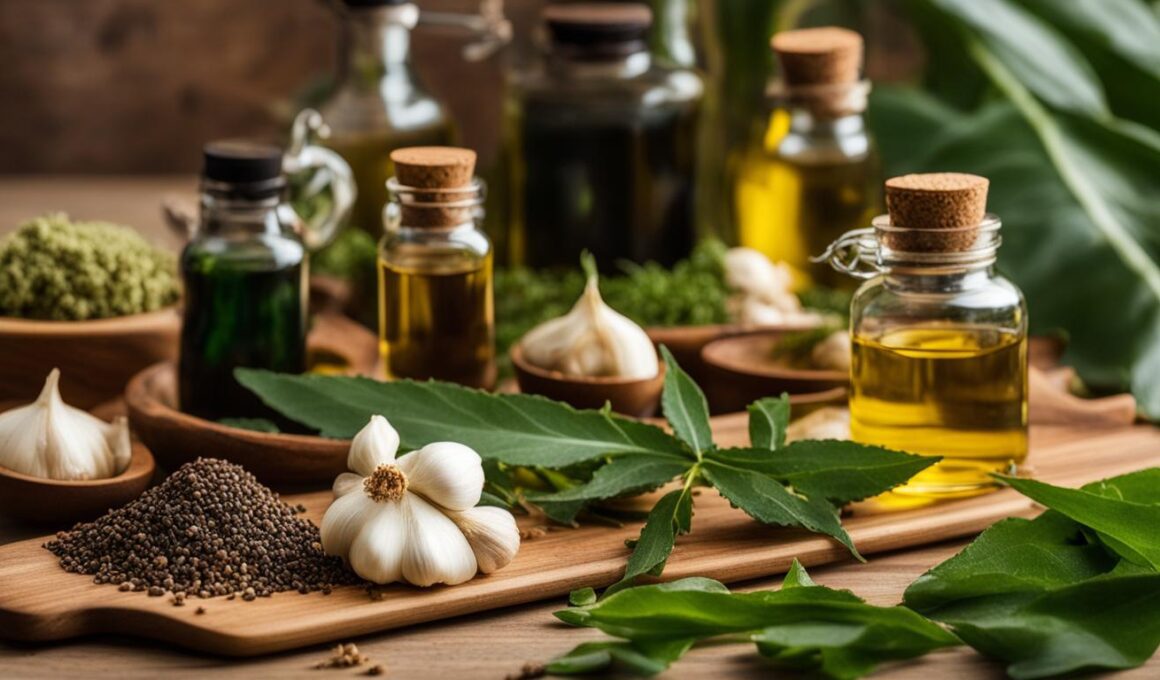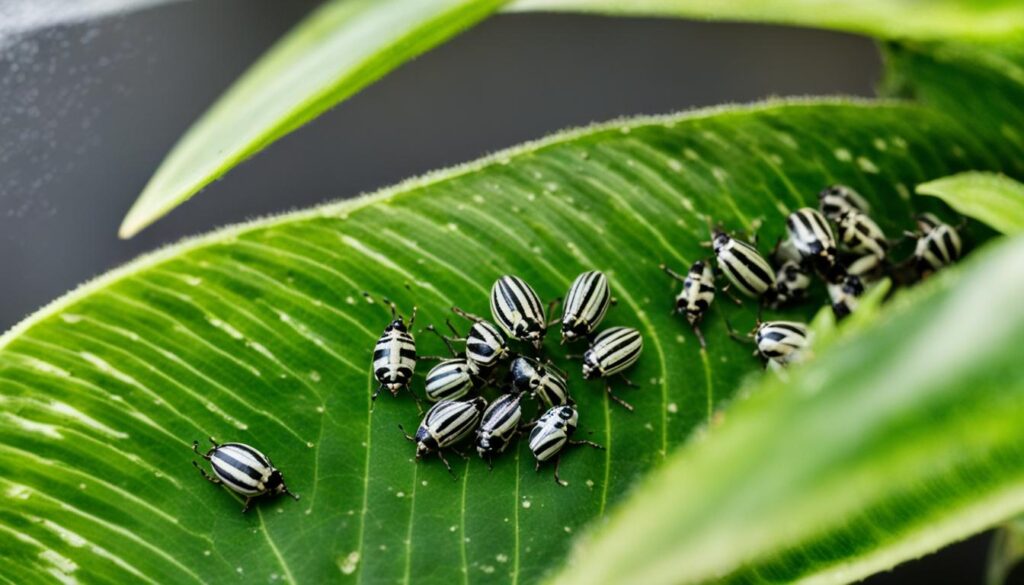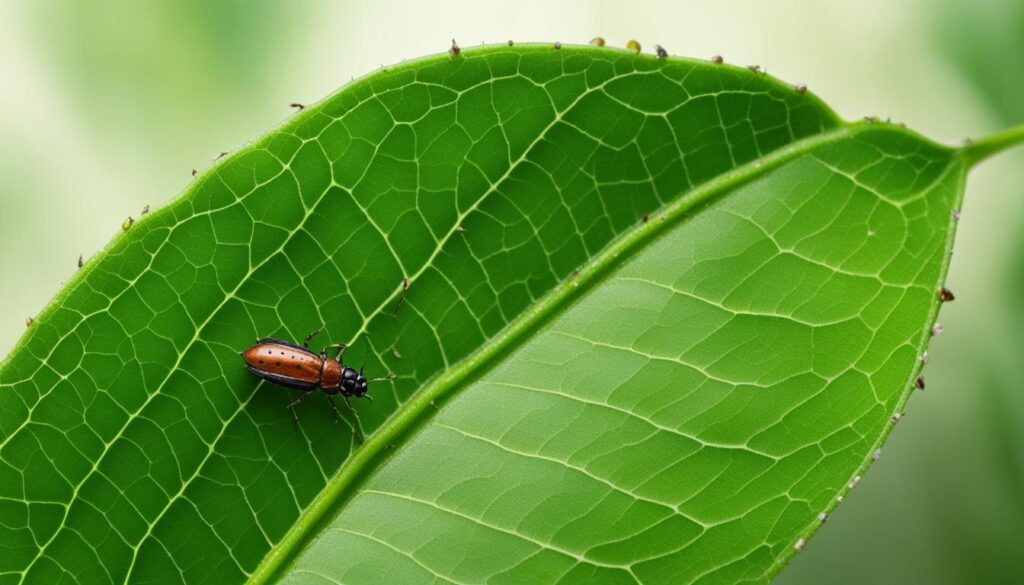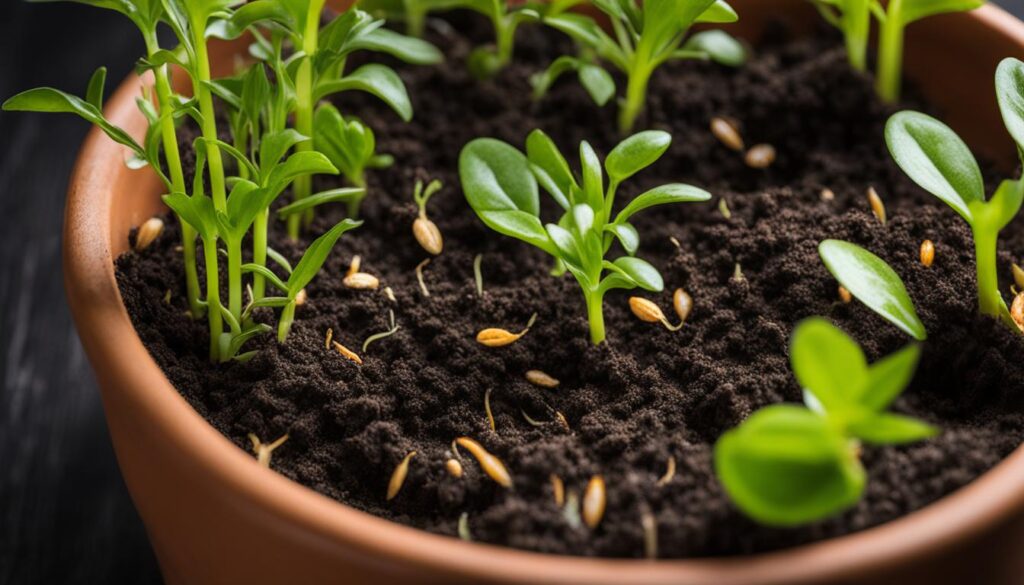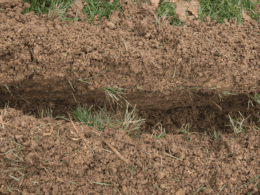If you’re a plant lover, you know that pesky bugs can be a nightmare to deal with. Whether it’s aphids, fungus gnats, spider mites, or whiteflies, these pests can wreak havoc on your houseplants. But fear not! In this guide, we’ll show you effective home remedies to eliminate and prevent bug infestations, without resorting to harsh chemicals.
Key Takeaways:
- Regularly check your houseplants for bug infestations, especially during colder months.
- Hydrogen peroxide solutions, diatomaceous earth, and neem oil are effective remedies to address bugs in houseplant soil.
- Identify common houseplant pests like aphids, fungus gnats, mealybugs, scale insects, spider mites, springtails, and whiteflies for targeted treatment.
- Treatment options include insecticidal soaps and sprays, rubbing alcohol, and introducing beneficial insects.
- Prevention and early detection are key to keeping bugs away, including quarantining new plants and using natural bug deterrents.
Identifying Houseplant Pests: Common Bugs and Signs
Houseplants can be susceptible to various pests, which can cause significant damage if not addressed promptly. It is important to be able to identify common houseplant pests and recognize the signs of infestation. By familiarizing yourself with these pests, you can take timely action and protect your beloved plants.
1. Aphids: These small insects tend to cluster around new leaves and flower buds. They can be green, black, brown, or even pinkish in color.
2. Fungus Gnats: These tiny flies hover around the base of your houseplants. You may notice them flying around or see small black insects crawling on the soil surface.
3. Mealybugs: Mealybugs appear as white, powdery critters that usually congregate in clusters. They leave behind sticky sap on the plants, which can attract ants.
4. Scale Insects: Scale insects look like tan or brown oval bumps on leaves or stems. They may appear as raised bumps or even crusty growths on the plant surface.
5. Spider Mites: Spider mites are extremely small and can be challenging to spot without a magnifying glass. They leave behind fine webs between the leaves and stems of plants.
6. Springtails: These minuscule insects feed on decaying plant material. They are usually found in the soil and are attracted to moist conditions.
7. Whiteflies: Whiteflies resemble tiny white moths and can typically be found on the undersides of leaves. When disturbed, they will fly around in a cloud-like formation.
By recognizing these common houseplant pests and their distinctive signs, you can take appropriate measures to address infestations and keep your plants healthy and thriving.
How to Get Rid of Houseplant Bugs: Treatment Options
When it comes to dealing with houseplant bugs, there are several treatment options available to effectively eliminate these pesky pests. Here are some tried and tested methods you can use:
- Insecticidal soaps and sprays: These products, made from potassium salts of fatty acids or neem oil, can be used to kill soft-bodied insects like aphids, spider mites, and whiteflies. Simply apply the soap or spray directly to the affected areas of the plant, making sure to cover both the tops and undersides of the leaves.
- Rubbing alcohol: For mealybugs, dip a cotton swab in rubbing alcohol and gently dab it on the bugs to remove them. The alcohol breaks down the waxy coating on the bugs, ultimately killing them.
- Beneficial insects: Introducing insects like green lacewings and ladybugs to your houseplants can help control pests naturally. These beneficial insects feed on harmful pests, reducing their population and preventing infestations.
- Proper watering: Dry soil can deter fungus gnats and springtails, so make sure to allow the soil to dry out between waterings. This will help create an environment that is less appealing to these bugs.
Remember, prevention is key to keeping your houseplants bug-free. Regularly monitor your plants for signs of infestations and take immediate action if any bugs are found. By using these treatment options and practicing good plant care, you can effectively get rid of houseplant bugs and ensure the health and vitality of your indoor greenery.
Quote:
“Using insecticidal soaps and sprays made from potassium salts of fatty acids or neem oil is a safe and effective way to eliminate soft-bodied insects like aphids, spider mites, and whiteflies.” – Pest Control Expert
Prevention and Early Detection: Keeping Bugs Away
Preventing houseplant bugs is essential for maintaining the health and vitality of your indoor greenery. By implementing preventative measures and staying vigilant, you can keep pesky bugs at bay and avoid the need for extensive treatments.
Inspect Your Plants Regularly
- Take the time to routinely inspect your houseplants for any signs of pests, such as discolored leaves, webs, or the presence of insects.
- Pay special attention to the undersides of leaves, where many bugs like to hide.
- If you spot any potential infestations, take immediate action to prevent the pests from spreading.
Practice Good Plant Care
Caring for your plants properly not only promotes their overall health but also helps deter bugs from infesting them. Follow these tips to provide the best environment for your houseplants:
- Water your plants correctly, avoiding overwatering and ensuring the soil has a chance to dry out between waterings. This discourages pests like fungus gnats and springtails.
- Remove dead plant material from the soil surface regularly to eliminate potential breeding grounds for bugs.
- Ensure your houseplants receive the appropriate amount of sunlight for their specific needs. Healthy, well-lit plants are less susceptible to infestations.
Quarantine New Plants
When introducing new plants to your collection, it is crucial to quarantine them before placing them near your existing houseplants. This helps prevent the spread of any potential pests that may have come with the new plant. Keep it separate from your other plants for a few weeks and monitor it closely for signs of infestation.
By following these preventative measures and regularly inspecting your houseplants, you can catch potential bug problems early on and take immediate action to control them. Prevention and early detection are key to keeping bugs away and ensuring the long-term health of your plants.
Debugging Potting Soil: Ensuring Soil Health
Potting soil plays a crucial role in the health and vitality of your houseplants. Unfortunately, it can also serve as a breeding ground for bugs and pests. To ensure the soil’s health and prevent bug infestations, it’s essential to implement proper debugging techniques.
One effective method is to submerge the potting soil in slightly warm water for about 10 minutes. This process will force any bugs or larvae to the surface, allowing you to remove them. Remember to thoroughly dry out the soil after debugging to prevent the reinfestation of bugs.
Avoiding overwatering is another essential aspect of maintaining soil health. By allowing the soil to dry out between waterings and watering from the saucer, you create an environment that discourages bug infestations. This practice also helps promote healthy root growth and prevents waterlogged soil, which can attract pests.
Key points to remember for debugging potting soil:
- Submerge the soil in warm water for 10 minutes to force bugs to the surface.
- Thoroughly dry out the soil after debugging to prevent reinfestation.
- Avoid overwatering and allow the soil to dry out between waterings.
By following these practices, you can ensure the health of your potting soil and create an environment that is less favorable for bugs and pests. Creating a strong foundation of healthy soil is key to keeping your houseplants thriving and bug-free.
The Importance of Good Plant Care: Keeping Bugs at Bay
Proper plant care plays a crucial role in keeping pesky bugs away from your houseplants. By providing your plants with optimal conditions, you can create an environment that is less attractive to insects. One of the key aspects of good plant care is watering. Overwatering can create damp conditions that attract bugs, so it’s important to water your plants appropriately. Allow the soil to dry out between waterings, as this helps discourage insects from taking up residence in the moist environment.
Sunlight is another important factor in maintaining healthy plants and deterring bugs. Make sure your houseplants receive adequate sunlight according to their specific needs. This will promote strong growth and make your plants less susceptible to infestations. Additionally, regularly cleaning and removing dead plant material from the soil surface can help prevent bugs from finding a food source and laying eggs.
To further enhance bug prevention, consider using natural pest control methods. For example, introducing beneficial insects like ladybugs and green lacewings can help control pest populations without the need for harsh chemicals. These predatory insects feed on common houseplant pests like aphids and whiteflies, effectively keeping their numbers in check. By prioritizing good plant care practices and incorporating natural pest control methods, you can create a thriving indoor garden that is less prone to bug problems.
Summary:
- Proper watering practices, such as allowing the soil to dry out between waterings, can deter bugs.
- Providing optimal sunlight for your houseplants promotes healthy growth and reduces the risk of infestations.
- Regularly cleaning and removing dead plant material from the soil surface helps prevent bugs from finding a food source.
- Introducing beneficial insects like ladybugs and green lacewings can naturally control pest populations.
Conclusion
Dealing with bugs in houseplants can be challenging, but there are effective remedies and preventative measures you can take to safeguard your indoor greenery. Home remedies such as hydrogen peroxide solutions, diatomaceous earth, and neem oil offer natural and effective solutions for eliminating and preventing bug infestations. Regularly monitoring your plants for signs of pests, practicing good plant care, and taking immediate action can help maintain a bug-free environment for your houseplants.
By implementing these home remedies and following preventative measures, you can protect your indoor plants without resorting to harsh chemicals. Remember to regularly check your houseplants for infestations, especially during colder months when pests thrive indoors. By addressing bugs in houseplant soil naturally and using organic pesticides, you can prevent and treat infestations while controlling the spread of pests through plant movement and isolation.
With proper care and attention, your houseplants can thrive and remain free from bug problems. Keep your plants healthy and resilient against pests by providing the right amount of water, sunlight, and soil conditions. Remember to also keep your plants’ environment clean by removing dead plant material regularly. By following these tips and home remedies, you can enjoy beautiful and pest-free houseplants all year round.
Are Home Remedies for Houseplant Bugs Safe and Effective?
Home remedies for houseplant bugs such as indoor plant bug repellent can be safe and effective. Natural repellents like neem oil, dish soap, and essential oils can help control pests without harming your plants. However, it’s important to do a patch test before applying any remedy to ensure it won’t harm your plants.
FAQ
What are some effective home remedies for houseplant bugs?
Home remedies like hydrogen peroxide solutions, diatomaceous earth, and neem oil offer effective and natural solutions for eliminating and preventing bug infestations.
How can I identify common houseplant pests?
Common houseplant pests include aphids, fungus gnats, mealybugs, scale insects, spider mites, springtails, and whiteflies. Each pest has distinct signs that can help with identification.
What are the treatment options for houseplant bugs?
Treatment options for houseplant bugs include using insecticidal soaps and sprays, introducing beneficial insects, applying rubbing alcohol, and employing natural insecticides like neem oil.
What can I do to prevent and detect bugs in my houseplants?
Preventing bug infestations in houseplants involves quarantining new plants, regularly inspecting them for pests, practicing good plant care, and taking immediate action if any infestations are found.
How can I debug potting soil to prevent bug infestations?
Submerging the soil in slightly warm water for about 10 minutes can force bugs to the surface and allow them to be removed. Thoroughly drying out the soil after debugging is important to ensure soil health and prevent reinfestation.
Why is good plant care important for bug prevention?
Providing the right amount of water, sunlight, and soil conditions helps keep plants healthy and resilient against pests. Proper watering practices, avoiding overwatering, and regular cleaning can deter insects.





